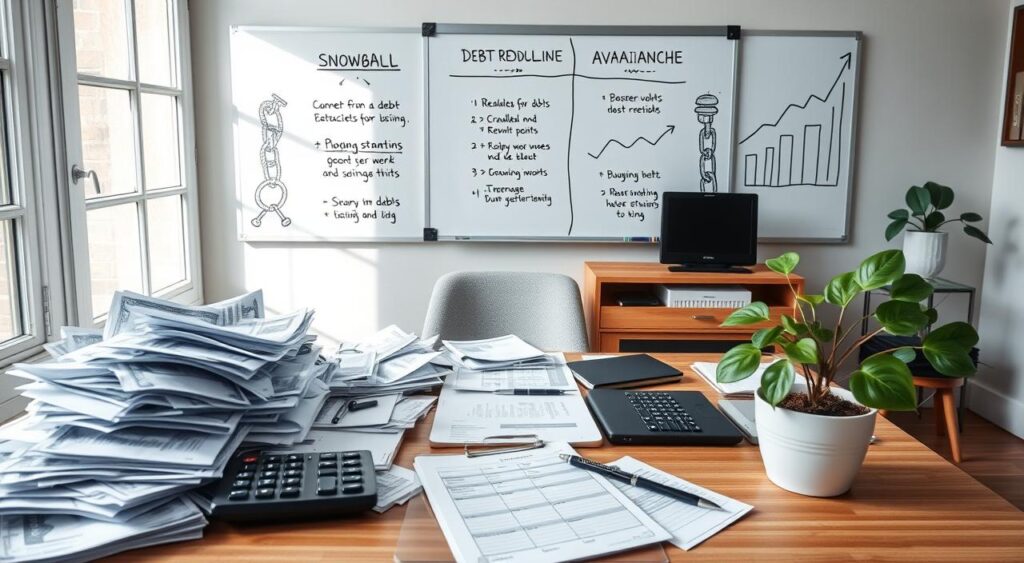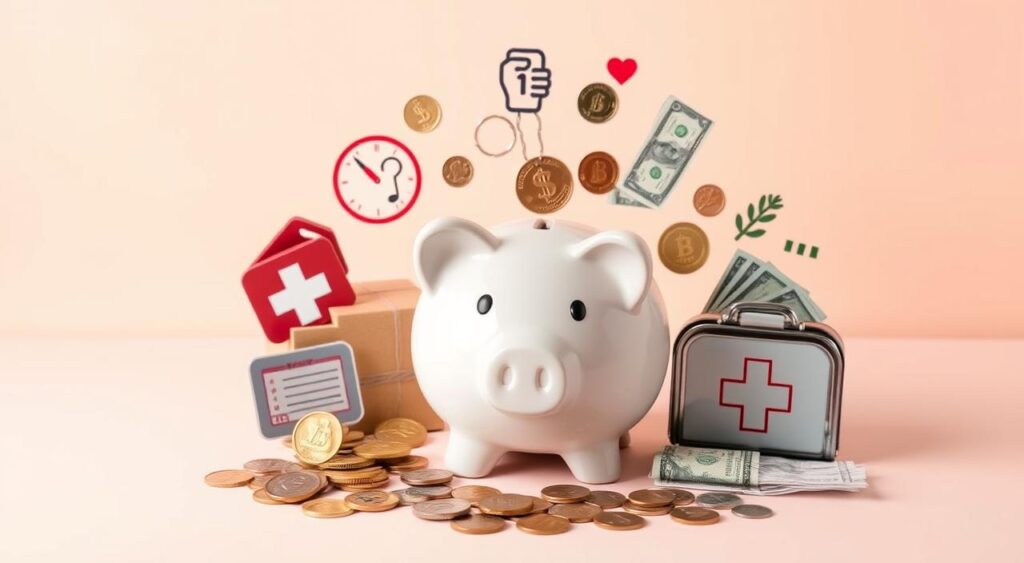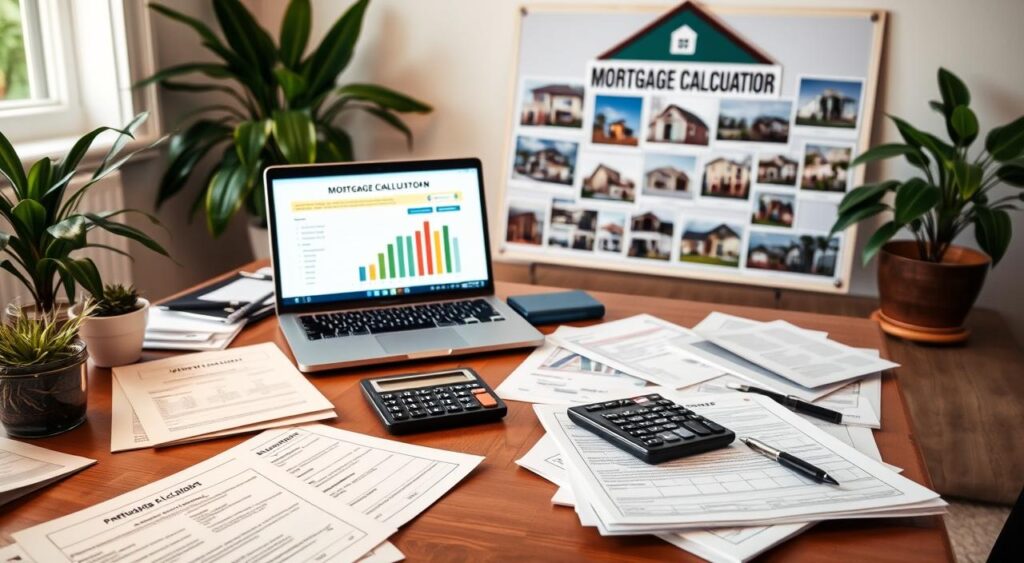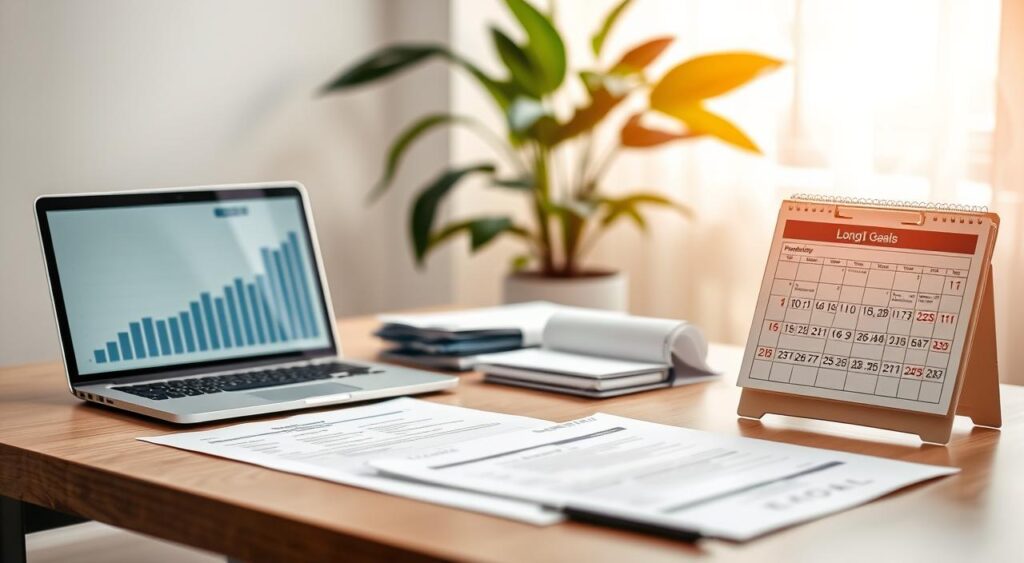Did you know the debt-to-income ratio for home loans should be under 43%? This fact shows how crucial it is to prepare your finances early. Start planning at least a year before you want to move in. This way, you can improve your credit score, pay off debt, and save for a down payment.
Key Takeaways
- Determine your budget and research mortgage options to set realistic home buying goals.
- Boost your credit score by reducing existing debt and building an emergency fund.
- Start saving for a down payment and understand all costs involved, including closing costs and moving expenses.
- Maintain stable employment, review your credit reports, and avoid major financial changes to prepare for the home loan process.
- Research your local housing market to identify desirable neighborhoods and get pre-approved for a mortgage.
Set Realistic Home Buying Goals
Starting your home buying journey is exciting. It’s key to set goals that match your finances. You need to plan your home buying budget and look at mortgage pre-approval options carefully.
Determine Your Budget
First, check your income, expenses, and debt-to-income ratio. This will tell you the highest home price you can afford. Your monthly housing costs should be 25-28% of your income. Also, your total debt should not be more than 8-10% of your income.
Research Mortgage Options
Look into various mortgage types like conventional, FHA, VA, and jumbo loans. Talk to a loan officer to learn about the mortgage pre-approval process. This includes down payments, closing costs, and monthly payments. A small interest rate drop can save you a lot over time.
Setting realistic goals helps you find a home that fits your budget. This way, you get the comfort and stability you need.
| Metric | Guideline |
|---|---|
| Monthly Housing Costs | 25-28% of Gross Household Income |
| Total Debt-to-Income Ratio | 8-10% of Gross Monthly Income |
| Median Down Payment | 15% for All Buyers, 8% for First-Time Buyers, 19% for Repeat Buyers |
| Closing Costs | 2-7% of Home Price |
“Even a slight decrease in the interest rate, like 0.5%, can result in significant savings over the life of the loan.”
Boost Your Credit Score
Your credit score is key when lenders look at your mortgage application. A higher score means better interest rates, making your loan cheaper. Start by checking your credit report for mistakes that lower your score. Then, work on improving it by paying bills on time and reducing debt.
The minimum credit score for a conventional mortgage is 620. Other mortgages need scores between 500 and 700. The average score for a purchase loan is 738, and the national average is 717 as of October 2023.
What makes up a FICO score includes payment history (35%), debt amount (30%), credit history length (15%), new accounts (10%), and credit types (10%). Keeping a good credit history and low debt is key for a better score and rate.
| Loan Type | Minimum Credit Score |
|---|---|
| Conventional | 620 |
| FHA | 500 (10% down) or 580 (3.5% down) |
Lenders prefer few credit inquiries and new accounts before your application. They also like a debt-to-income ratio under 43%, but some programs allow up to 50%. A stable job and low credit use also help your score and application.
“Monitoring your credit throughout the mortgage process is crucial, as any negative changes could impact your approval odds.”
By improving your credit score actively, you boost your chances for a good mortgage. This makes buying a home easier.
Reduce Existing Debt
Before you apply for a home loan, it’s key to lower your debt. Your debt-to-income (DTI) ratio is very important to lenders. High credit card debt can hurt your DTI, leading to higher interest rates or even a loan denial.
Develop a Debt Repayment Plan
To tackle your debt, make a smart repayment plan. The debt avalanche method pays off the highest-interest debt first. This saves you the most in interest over time. Or, the debt snowball method focuses on the smallest balances first. This gives you quick wins and keeps you motivated.
Consider Debt Consolidation
Debt consolidation can make your payments easier and lower your interest rates. It combines your debts into one loan, often with a lower rate. This can save you money and make paying off your debt simpler. Balance transfer credit cards with 0% APR can also help you pay off your debt faster.
| Debt Reduction Strategies | Pros | Cons |
|---|---|---|
| Debt Avalanche Method | – Saves the most in interest over time – Targets high-interest debt first | – May take longer to see progress on smaller debts |
| Debt Snowball Method | – Provides a sense of accomplishment – Builds momentum as smaller debts are paid off | – May pay more in interest over time |
| Debt Consolidation | – Simplifies payments – Potentially lowers interest rates | – May require a new loan with its own fees and terms |
Try to pay off or lower your credit card debt at least six months before applying for a home loan. This will improve your DTI ratio and credit score. A better credit score makes you more attractive to lenders.

“Reducing your existing debt is a crucial step in preparing for a home loan. It can improve your debt-to-income ratio and credit score, ultimately helping you secure better interest rates and loan terms.”
Build an Emergency Fund
Before you buy a home, it’s key to have an emergency fund ready. You never know when you’ll face unexpected costs like home repairs or medical bills. Experts say to save three to six months’ living expenses in a high-yield savings account. Marcus by Goldman Sachs and Ally Bank offer great options.
Only 44 percent of Americans can cover a $1,000 expense from savings. More than half have less than three months’ emergency savings. Also, 57 percent are not happy with their emergency savings, and 66 percent fear they can’t cover a month’s expenses if they lose their job.
To grow your down payment savings, try these tips:
- Automate your savings by setting up recurring transfers from your checking account to a dedicated emergency fund.
- Take advantage of one-time opportunities, such as tax refunds or work bonuses, to quickly boost your emergency fund.
- Establish a specific savings goal and track your progress to stay motivated.
- Set guidelines for what constitutes a true emergency to avoid dipping into the fund unnecessarily.
By focusing on an emergency fund, you’ll be ready for any financial surprises. This ensures you can keep up with mortgage payments, even if you lose your job. A well-stocked emergency account gives you peace of mind and a strong base for your down payment savings.
| Statistic | Value |
|---|---|
| Americans who could afford a $1,000 expense from savings | 44% |
| Americans with less than 3 months’ worth of emergency savings | 53% |
| Americans uncomfortable with their emergency savings level | 57% |
| Americans worried they couldn’t cover a month’s expenses if they lost their job | 66% |
| Personal saving rate in the U.S. (December 2023) | 3.7% |

“Building an emergency fund is crucial for homebuyers, as it can help you weather unexpected financial challenges and ensure you can continue making your mortgage payments, even in the face of job loss or other setbacks.”
Start Saving for a Down Payment
Saving for a down payment is key when buying a home. The amount you put down affects your monthly payments and financial health. Even though some loans require little to no down payment, saving more is always better.
The National Association of Realtors says the median down payment is 15 percent. But, the amount needed can change based on the mortgage and home price. To afford a home priced at $420,800, one might need about $40,000 for the down payment and closing costs.
Creating a savings plan is essential. It can take from 11.43 months to 40 months to save $40,000. Saving 20% of the home’s price can help avoid extra insurance costs and get a better interest rate.
| Region | Median Home Price | 20% Down Payment | Closing Costs (3-6%) | Total Upfront Costs |
|---|---|---|---|---|
| Northeast | $785,300 | $157,060 | $23,559 – $47,118 | $180,619 – $204,178 |
| Midwest | $375,800 | $75,160 | $11,274 – $22,548 | $86,434 – $97,708 |
| South | $376,500 | $75,300 | $11,295 – $22,590 | $86,595 – $97,890 |
| West | $548,400 | $109,680 | $16,452 – $32,904 | $126,132 – $142,584 |
To start saving for your down payment, consider these strategies:
- Set up a separate high-yield savings account for your home purchase goals.
- Automate your savings by setting up regular transfers from your checking account.
- Implement lifestyle changes, such as reducing expenses on entertainment, dining out, and non-essential services.
- Carefully explore 401(k) withdrawal options, as they can provide access to funds for a down payment.
Saving for a down payment may seem daunting, but with a well-structured plan and disciplined savings habits, you can make it a reality. Remember, the more you can put down upfront, the better your financial position will be when you finally become a homeowner.

Understand All Costs Involved
Buying a home is more than just the down payment. As you get ready for the mortgage pre-approval, know the extra costs. These include closing costs, moving expenses, and ongoing homeownership costs.
Closing Costs
Closing costs can be 2% to 6% of the loan amount. For a $200,000 mortgage, you might pay $4,000 to $12,000. These costs cover appraisals, underwriting, title insurance, and more. Talk to a loan officer to understand these costs better.
Moving Expenses
Remember to include moving costs. Local moves average $1,700. Long-distance moves over 100 miles can cost $2,700 to $10,000. This covers movers, truck rentals, and initial utility fees.
Knowing all costs in the mortgage pre-approval and homeownership helps you prepare. This way, you can make smart choices about buying a home.

tips to prepare for home loan one year early
Getting a home loan can seem scary, but with the right prep, it’s easier. Here are some tips to help you prepare for a home loan application a year early:
- Determine Your Budget: First, check how much you can afford for a home. Look at your income, debt, and expenses.
- Check Your Credit Score: Look at your credit report and work on improving your score. A better score means better loan terms.
- Pay Down Debt: Try to pay off any debts you have. This will make you a more attractive borrower.
- Save for a Down Payment: Aim to save at least 20% of the home’s value. This can help you avoid extra insurance costs and get a better rate.
- Research Mortgage Options: Learn about different mortgages like conventional, FHA, VA, and USDA loans. Understand their requirements and benefits.
By starting early, you’ll be ready for a home loan that fits your budget. Remember, good preparation is key to a smooth home buying journey.
“The key to a successful home purchase is to start planning and preparing well in advance. Taking the time to get your finances in order will pay off in the long run.”

The path to owning a home is long. But by preparing a year in advance, you’ll be ready for the loan process. You’ll be closer to making your dream of homeownership come true.
Maintain Stable Employment
Getting a home loan often depends on having stable employment. Lenders look closely at your job history. They might not approve your loan if you’ve recently changed jobs or industries. Employment stability considerations are key to showing you can make regular mortgage payments.
Most lenders want to see at least two years of work history. This helps them understand your income and future earnings. If you’ve been at your current job for six months and have two years of steady work, you’re more likely to get a mortgage.
- Lenders like applicants who’ve worked for at least 24 months to get a home loan.
- Self-employed people need to show two years of business tax returns to prove their income is stable.
- Changing jobs is okay for a mortgage if the new job is in the same field and your income stays the same or goes up.
Keeping your job stable is very important when you’re getting a home loan. Showing a steady work history reassures lenders you can pay your mortgage on time. This boosts your chances of getting the loan you need.

Review Your Credit Reports
When you’re getting ready for a home loan, checking your credit reports is key. Your credit score affects if you can get a mortgage and the interest rate you’ll pay. Looking over your credit reports helps you find and fix any mistakes that might hurt your score.
The FICO credit score ranges from 300 to 850. A higher score means you’re more likely to get a loan and get a better interest rate. As of March 2015, the average FICO score was 721. This means a score of 661 or higher is good for getting a mortgage.
- Get a free credit report from Equifax, Experian, and TransUnion. You can get one free report from each of these companies every year.
- Check your reports for mistakes like late payments or wrong credit limits. Look for any signs of fraud too.
- If you find any mistakes, tell the credit agencies and the companies that gave you credit. This way, they can fix the errors.
Fixing mistakes on your credit reports can really help your score. This can make it easier to get a good mortgage. Good credit scores mean you can get lower interest rates and save money on your mortgage payments.
“Checking your credit reports carefully is important. It helps you find errors, fraud, and old information that can affect your score and loan chances.”
| Credit Score Component | Impact on Score |
|---|---|
| Payment History | Includes details on timely payments, missed payments, and accounts in collection. |
| Amount of Debt | Compares the debt carried to available credit or original loan balance. |
| Length of Credit History | Reflects the duration of borrowing activities. |
| Credit Mix | Considers the variety of loans managed. |
| New Credit | Evaluates recent account openings or applications. |
Knowing what makes up your credit score and how to improve it can really help. It can make your credit score improvement better and help you get a good home loan.
Avoid Major Financial Changes
When getting ready for a mortgage pre-approval, it’s important to not make big financial moves before applying. Changes can hurt your debt-to-income ratio and credit score. These are important to lenders when they decide if you can get a mortgage.
Experts say a credit score under 620 might make it hard to get a conventional mortgage. For an FHA loan, you need a 580 score to get a 3.5% down payment. Scores between 500 and 579 need a 10% down payment.
Lenders want to see two years of steady work in the same job. FICO says payment history is 35% of your credit score. So, keep your payments on time and avoid new credit or big buys that could raise your credit use.
Closing a credit card can raise your credit use over 30%, which lenders don’t like. Also, a high debt-to-income ratio makes it harder to get a mortgage. Lenders usually want a DTI of 36% or less.
By staying financially stable, you can make the mortgage pre-approval process easier. This will help you have a successful home-buying journey.
Research Your Housing Market
Before you start looking for a home, it’s key to research the local real estate market. This info helps you make smart choices and find a home that fits your budget and lifestyle. Knowing how to research and analyze the market will help you in the competitive housing world.
Understand Local Home Prices
Start by looking at current trends in your area. Check the prices of similar homes recently sold. This helps you understand the market value and avoid homes that are too expensive.
Identify Desirable Neighborhoods
After knowing home prices, find the best neighborhoods for you. Look at school districts, commute times, amenities, and community feel. This research helps narrow your search and find a place that fits your goals and lifestyle.
By diving into property research methods and real estate market analysis, you’ll be ready to buy a home with confidence. With this knowledge, you can make smart choices and find the right home for you.
| Key Real Estate Statistics | 2022 | 2023 | 2024 |
|---|---|---|---|
| Mortgage Rates | Near 23-year High | Remain High | Remain High |
| Housing Prices | Near All-Time Record | Remain High | Remain High |
| Inventory | Tight Across Nation | Tight Across Nation | Shifting Towards Balance |
“Understanding the local real estate market is crucial for making informed home-buying decisions. By researching property values, neighborhood trends, and market conditions, you can find a home that fits your budget and lifestyle.”
Get Pre-Approved for a Mortgage
Getting a mortgage pre-approval is a key step in buying a home. You’ll share your financial details with your lender. This includes your income, credit history, and assets. The lender will then check if you qualify for a loan and tell you how much you can borrow.
Having a pre-approval letter shows you’re serious about buying a home. It makes you more appealing to sellers. It also helps you know your budget. This way, you can look for homes that fit your price range.
- Gather the necessary financial documents, including pay stubs, tax returns, and bank statements.
- Work with a reputable lender to complete the pre-approval application and provide the required information.
- Review the pre-approval letter carefully, ensuring you understand the terms and conditions of the loan.
By getting pre-approved for a mortgage pre-approval process, you’re ready to find your dream home. Knowing your budget and having a pre-approval letter will help you buy a home smoothly.
“Getting pre-approved for a mortgage is one of the most important steps in the home-buying process. It gives you a clear idea of what you can afford and makes you a stronger buyer in the eyes of sellers.”
Establish a Homeownership Timeline
Getting ready for a home loan a year early needs careful planning. You must set up a clear timeline for homeownership. This helps you stay focused and organized for a smooth home purchase.
Zillow research shows about 50% of homebuyers look for homes for less than three months. Meanwhile, 13% search for seven months to a year. The average home search lasts about four and a half months. Closing on a house usually takes 50 days, with appraisal and inspection adding 1-3 weeks each.
When making your homeownership timeline, remember these important steps:
- Work on improving your credit score and reducing debt
- Plan to save the down payment you want
- Make time to research and get pre-approved for a mortgage
- Explore the local housing market and find good neighborhoods
- Include time for the home buying process, like appraisal and inspection
Planning ahead and setting a clear timeline boosts your chances of a smooth home buying journey. This way, you can reach your tips to prepare for home loan one year early goal.
| Home Buying Timeline Milestones | Estimated Duration |
|---|---|
| Home Search | 3-7 months |
| Mortgage Pre-Approval | 1-2 weeks |
| Home Appraisal | 1-2 weeks |
| Home Inspection | 1-3 weeks |
| Closing Process | 4-6 weeks |
“By establishing a clear timeline, you can stay focused and on track, ultimately increasing your chances of a successful and stress-free home buying experience.”
Conclusion
Getting ready for a home loan a year early can make the process easier. You can set goals, improve your credit, and save money. This helps you buy a home smoothly.
Keep your job stable and check your credit reports often. Avoid big money changes before applying for a mortgage. A good plan can help you own a home.
Being proactive and informed is key when getting a home loan. Focus on your financial goals and explore different mortgage options. Work with trusted experts for a smooth experience.
Starting your journey to homeownership is thrilling. With the right preparation, you can make your dreams come true. Stay organized and flexible in the changing housing market.
With determination and smart strategies, you’ll soon be a proud homeowner.
FAQ
What are the benefits of preparing for a home loan at least one year in advance?
Preparing for a home loan a year early helps you get your finances ready. It boosts your credit score and reduces debt. You’ll also save for a down payment. This puts you in a strong position to get a good mortgage and buy a home confidently.
How can I determine a realistic home buying budget?
To find a realistic budget, look at your income, expenses, and debt. Check your debt-to-income ratio. Then, explore different mortgage options. This will help you choose the best one for you.
Why is it important to improve my credit score before applying for a mortgage?
Your credit score is key when lenders review your mortgage application. A higher score means lower interest rates. This makes your loan more affordable.
What are some effective strategies for reducing existing debt?
There are two main ways to pay off debt: the debt snowball and the debt avalanche. The debt snowball method focuses on the smallest debt first. The debt avalanche targets the highest-interest debt. Debt consolidation can also simplify payments and lower interest rates.
How much should I save for a down payment and other upfront costs?
Saving more for a down payment means lower monthly payments. You’ll also need money for closing costs, which are 2% to 5% of the loan amount. Don’t forget to save for moving expenses too.
What are the key tips to prepare for a home loan one year in advance?
Key tips include figuring out what you can afford and setting a savings goal. Consider all costs, check your credit, and avoid new credit offers. Improve your debt-to-income ratio and keep a paper trail. Pay your taxes, disclose gift funds, and maintain stable employment.
Why is maintaining stable employment important when applying for a mortgage?
Lenders look at your job history. They might hesitate if you’ve recently changed jobs or industries. This could affect your ability to make mortgage payments.
How can I ensure my credit reports are accurate before applying for a mortgage?
Get a free credit report from Experian, Equifax, and TransUnion. Fix any errors to improve your score. A better score can get you a better interest rate.
What financial changes should I avoid in the months leading up to my mortgage application?
Avoid big financial changes before applying for a mortgage. This includes opening new credit cards or taking out loans. These actions can hurt your debt-to-income ratio and credit score.
How can I research the local housing market to make informed decisions?
Researching the local market helps you understand home prices and neighborhoods. This information helps you make smart choices during your home search.
What are the benefits of getting pre-approved for a mortgage?
Getting pre-approved means providing financial info to a lender. They’ll assess your creditworthiness and give you a pre-approval letter. This makes you a more attractive buyer and simplifies the home buying process.
How can I create a timeline for my homeownership goals?
Create a timeline for your homeownership goals. Include steps like improving your credit, saving for a down payment, and getting pre-approved. This keeps you focused and increases your chances of a smooth home buying experience.

